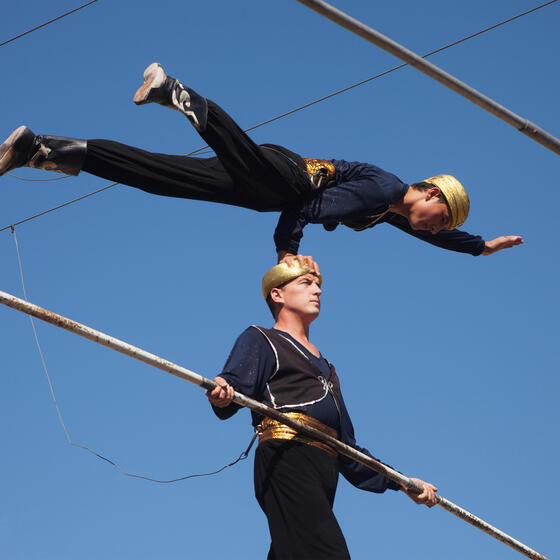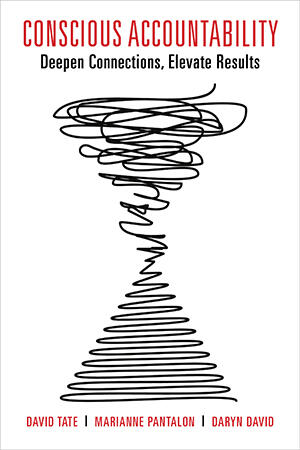Why Accountability Needs an Upgrade
In an excerpt from their new book, Conscious Accountability, Yale SOM’s David Tate and his co-authors Marianne Pantalon and Daryn David argue for looking beyond blame and punishment and embracing a form of accountability based on clear communication and mutual trust.

In every relationship we have with an individual, group, or organization, there is an accountability equation at play. We need and expect things from others, and they need and expect things from us, even if these mutual expectations are implicit and unspoken. Whether we acknowledge it or not, relationships are the fabric of the human condition, and therefore accountability is always present and inescapable.
In a traditional sense, we think of accountability as having to answer to, or justify behaviors and actions to, someone else. But this has serious flaws in how we interact with people on a personal and professional level. It’s inherently transactional, focused on blame, and relegates how well we get along and our commitment to the relationship as secondary, perhaps not even considered consciously, in our effort to get the job done.
Conscious accountability is a practice of working together in ways that catalyze interpersonal connections and produce excellent task outcomes. The power of conscious accountability lies in its potential to change leaders and teams from good—getting things done, getting pretty good results—to fantastic. That means getting things done with excellence, greater consistency, and doing it in a way that drives learning and connection. This leads to greater joy, passion, and satisfaction in the work itself. Imagine getting up every day and feeling like this and working with others who feel similarly. When we bring conscious awareness together with accountability, we take accountability to an entirely new level.
How Is Conscious Accountability Different?
We define conscious accountability as expanding awareness to create deliberate intentions, take informed actions, and be responsible for our impact. Let’s break that down a bit further. By awareness, we mean awareness of ourselves, awareness of other people, and awareness of the interdependence between self and others. Deliberate intentions refers to having preconceived ideas about what we want to do and about the desired effects we want to have on others. Informed actions are actions that are both informed by our awareness and consistent with our intentions. Finally, being responsible for our impact means acknowledging that our actions (and inactions) affect other people, and that we are willing to own the results that follow from our choices.

We consider conscious accountability to be a state that emerges as a result of engaging in a number of practices. Our book describes seven:
- Creating clarity
- Opening up engagement
- Nailing it
- Noticing
- Exchanging feedback
- Claiming it
- Trying again
One of the key ways that conscious accountability differs from traditional notions of accountability is that it focuses on two outcomes: relationship and results. Let’s unpack this difference a bit further.
One Outcome Versus Two
Joe was a financial executive who developed a strong reputation for being able to turn around startup organizations that were performing poorly and in financial trouble. He was able to go into organizations, quickly identify the opportunities for change, and then drive those changes in a way that produced remarkable fiscal improvements within six months. He attributed his success, in part, to his ability to hold people accountable to do what they were hired to do.
However, Joe had difficulty dealing with his fellow leaders, who were focused on the toll that his changes took on people. His relationships with these leaders were often strained, and therefore he typically did not stay in organizations after he made change happen. Joe believed it was an either-or proposition: either you can have happy people and good relationships, or you can have positive results, but not both. His perspective invites the question, “Can you have it all?”
Our answer to that question is a resounding “Yes, you can!”
Amy Edmondson, professor of management and leadership at Harvard Business School, highlighted the importance of psychological safety and accountability for getting into the “learning zone” of optimal teamwork and learning. Inspired by her rubric, we have developed a similar matrix to capture how conscious accountability can both result from and foster high-quality relationships and task performance.
To be a person who operates with conscious accountability, you need to hold these two things in your mind at once, and you have to behave in ways that consider both of these dimensions. Let’s look at what happens when you put performance or relationships before the other or prioritize neither.
Harmonizers
People who have a high focus on relationship quality but low focus on task performance are Harmonizers. They feel best when working in a group where everyone gets along well. Conflict is hard for them, and they prefer for people to be agreeable. If their team succeeds at a task but there are hard feelings, they believe they’ve failed. People and relationships come before performance and profits. In this situation, their team’s productivity may suffer and dissatisfaction may ensue from a lack of challenge or from a collective sense of underperforming.
Hard Drivers
When people weigh task performance over relationship quality, they may create a climate where productivity and efficient output are maximized at all costs. They are known as Hard Drivers. They consistently strive to do their best, and they expect everyone around them to do the same. They like bottom-line outcomes: They either hit their mark or they don’t. They consider explanations excuses. They believe people need to take responsibility for their work and if they can’t perform, they need to move on. Under these conditions, people might feel undervalued, underappreciated, and unseen, as well as anxious about their performance. They may also be afraid to admit mistakes, ask for help, or show other signs of vulnerability or weakness.
Neutralizers
If people do not take task performance or relationship quality into consideration, they are called Neutralizers. They may pride themselves on being easygoing and adaptable. When decisions need to be made, they are comfortable deferring to the expert in the room, voting neutrally, or abstaining altogether. It feels good when their team gets along and performs well, but they are not going to lose any sleep over any challenges they face. Work may not be where they get significant meaning in life, so they are not going to knock themselves out over any of it. In this kind of environment, people can easily slide into disengagement from one another, and from the work at hand.
As you think about these descriptions, can you think of a time when you were in a situation in which either task performance or relationship quality was emphasized at the cost of the other? What did that feel like? How would it have been different if both were emphasized equally?
Conscious Performers
Conscious performers are the people who can balance and include a focus on both task performance and relationship quality. They tend to be observant and are sure to notice a team’s energy. They like to dig deep to uncover the root causes of challenges. For them, when people understand and appreciate each other, they can drive better results. They think divergent opinions and approaches are essential for optimizing outcomes, and that everyone’s voice should be heard. They cannot optimize results without optimizing their team dynamics. To them, the two go hand in hand.
People who approach accountability in this way become increasingly aware of themselves and each other’s influences, more deeply connected to each other, and more efficient and able to work consistently at high levels of performance. They do not see their work interactions as a series of transactions to be met.
Embrace the Journey
Conscious accountability aspires to change the more traditional perspective of accountability into a transformational process by expanding our awareness of the multitude of influences affecting our relationships and work efforts. Leveraging this awareness results in greater intentionality, more informed decisions, and the ability to more readily see and take responsibility for our actions. In this way, accountability evolves from reacting to the past behavior of individuals to find out who is to blame and punish, into creatively harnessing the compassion and wisdom of the team and promoting perseverance and learning.
The journey toward awareness is a life’s work. If you choose to engage in this work, we encourage you to remain humble and curious. Humility helps us acknowledge that no one has all the answers, we are all muddling through at some point or another, and there is an ocean of unknowns. Curiosity lights the desire to explore and venture into territories that are currently hidden or unknown and fuels us along this never-ending endeavor. The payoff is that by doing the work to be more conscious, we can become fuller versions of ourselves. And by becoming more conscious in terms of accountability, we can become the reliable and responsive person who people feel safe approaching, colleagues love to have on their team, and ups everyone’s game.